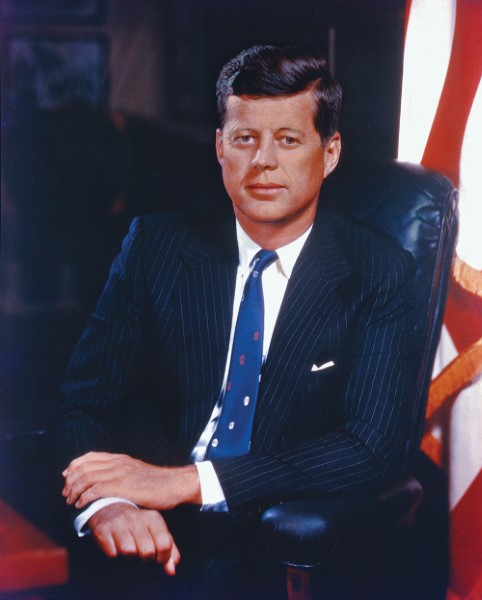
35 – John F. Kennedy (1961-1963)
When John Kennedy won the 1960 presidential race, he accomplished many firsts—the youngest person to be elected president, the first Roman Catholic to take this office, the first president born in the 20th century, and the only president to have won a Pulitzer Prize in Literature for his “Profiles in Courage.” Unfortunately, he will always be remembered for that tragic day in Dallas, November 22, 1963, that left a nation shocked and mourning its fallen leader.
One of nine children from a prominent wealthy Massachusetts family, Kennedy graduated from Harvard, became known as a war hero for his role in saving his PT-109 crew during WWII, and began his political career as a congressman and then senator.
His brief presidency saw the formation of the Peace Corps and an accelerated space program that sent Americans orbiting the earth and challenged them to one day land on the moon. The failed Bay of Pigs invasion, meant to oust Fidel Castro from power in 1961, coupled with the Cuban missile crisis thereafter brought this country to the brink of nuclear war, but the Soviet Union finally withdrew its missiles from Cuba.
Many tragedies and much pain haunted Kennedy’s life including the death of older brother Joseph in WWII, a debilitating back condition, his ongoing battle with Addison’s disease, and the loss of his infant son Patrick while in White House.
While Kennedy looked to what he called the “New Frontier,” Jackie, his wife, wistfully dubbed her husband’s presidency as the “Camelot” years, but it all ended when he was assassinated.
“Let us not seek the Republican answer or the Democratic answer, but the right answer. Let us not seek to fix the blame for the past. Let us accept our own responsibility for the future.”
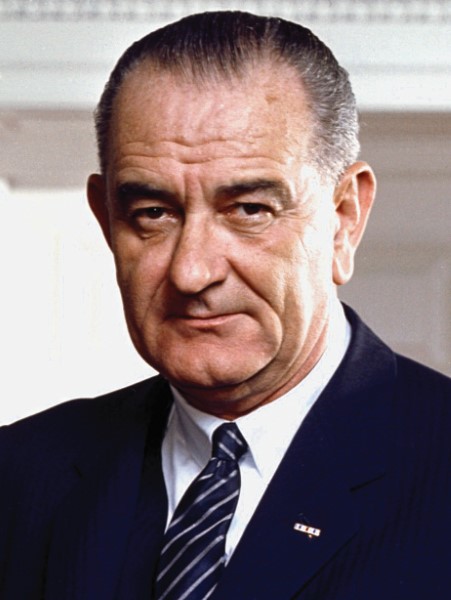
36 – Lyndon B. Johnson (1963-1969)
Aboard the Air Force One and standing next to Kennedy’s widow, Jackie, still dressed in her blood-stained pink suit, Lyndon Johnson took the presidential oath. It was the first time anyone had taken said oath aboard an airplane or been administered it by a female judge. A Texan from humble origins who started out as a high school teacher, Johnson served as a congressman and then joined the navy during WWII to receive the silver star.
Upon return, he ran for the Senate and grew powerful in his role as senate majority leader. In 1959, in a hotly contested convention, Johnson wanted the democratic presidential nomination but agreed to be Kennedy’s running mate.
In 1964, Johnson was elected to a full term as president by one of the greatest landslides in American history, gaining more than 61% of the vote against his Republican opponent Sen. Barry Goldwater of Arizona, and arch-conservative whose extreme views on most issues scared Americans.
As president, he promoted “The Great Society,” which included landmark civil rights bills and Medicare. His escalation of the Viet Nam War which had been going on since Eisenhower’s administration, cost him politically and he decided not to run in 1968.
Johnson liked to name things after his initials “LBJ” including his wife Lady Bird Johnson, his daughters Luci Baines Johnson and Lynda Bird Johnson, and his dog Little Beagle Johnson.
“I will do my best. It is all that I can do. I ask for your help and God’s.”
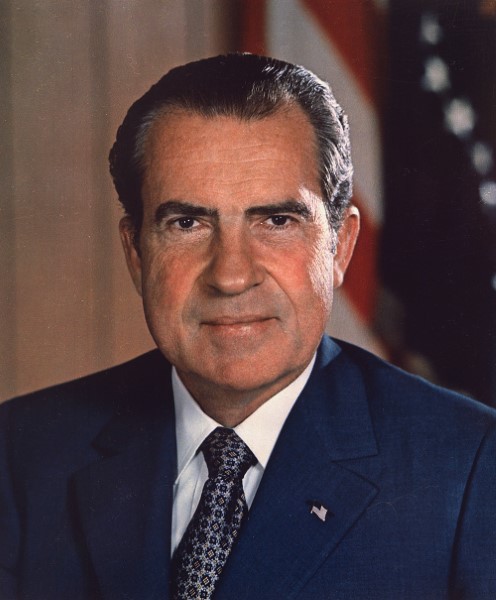
37 – Richard Nixon (1969-1974)
In 1968, Richard Nixon, a Californian Quaker, finally got to be president by winning against Hubert Humphrey and third-party candidate George Wallace. A graduate of Duke University Law School, Nixon served in the navy during WWII, becoming a lieutenant commander. A stint as congressman and senator followed. His youth (age 39) and anti-communism stance made Nixon the ideal running mate for Eisenhower and as vice-president for eight years, Nixon travelled over the world. Major accomplishments of the Nixon administration include opening diplomatic relationships with China in 1972, ending the Viet Nam War through Paris Peace Accords, easing tensions associated with the cold war, establishing the Environmental Protection Agency, and landing a man on the moon in 1969. His 2nd term began with a landslide victory over George McGovern and included the resignation of his vice president Spiro Agnew for having received bribes from contractors. Nixon appointed Gerald Ford as Agnew’s replacement. Then, Nixon himself resigned after it became clear that he would be impeached for the Watergate affair where a democratic headquarter break-in was covered up by the administration. Nixon loved music and could play five musical instruments. He wrote several books in addition to his memoirs.
“People have got to know whether or not their president is a crook. Well, I’m not a crook. I earned everything I got.”
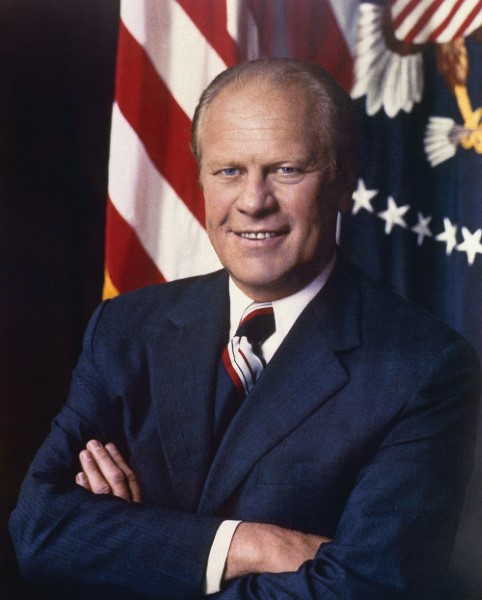
38 – Gerald Ford (1974-1977)
With Nixon’s sudden resignation, Gerald Ford, who had changed his birth name Leslie Lynch King Jr. to honor his stepfather, took on the presidency. He was the first and only person to gain that office not having been voted in as president or vice-president. Born in Nebraska and raised in Michigan, Ford graduated from law school and served in the navy in WWII.
Upon his return, he served in the House of Representatives for 25 years until becoming Nixon’s vice president. His 895-day presidency, the shortest in U.S. history save for those who died in office, was fraught with economic issues including inflation, rising unemployment, and an energy crisis, which Ford addressed with tax cuts.
He approved a massive swine flu vaccination program which, in hindsight, suffered problems and appeared to have been unnecessary.
U.S. involvement with South Viet Nam ended when he withdrew remaining troops and Saigon fell to the North Vietnamese. Ford attempted to ease tensions with the Soviet Union through the signing of the Helsinki Accords.
His wife, Betty, a popular first lady struggled with breast cancer in the opening days of his presidency and formed a bond with citizens through her honest sharing of her struggles with addiction. In the end, many did not like Ford’s pardoning of Nixon for the Watergate affair and it probably cost him politically.
“I assume the presidency under extraordinary circumstances…This is an hour of history that troubles our minds and hurts our hearts.”
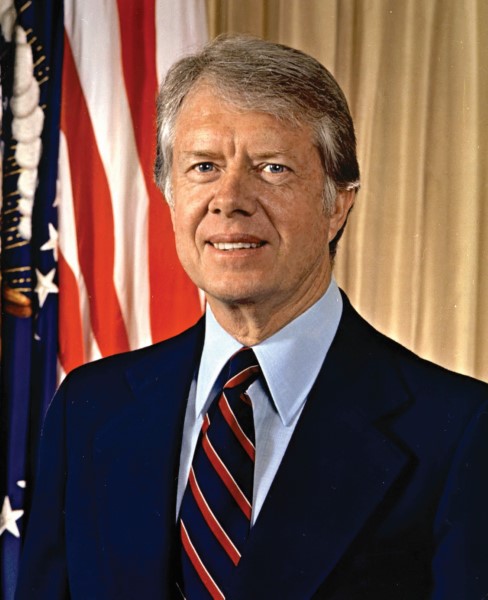
39 – Jimmy Carter (1977-1981)
Raised in Plains, Georgia, Jimmy Carter, the first president born in a hospital, graduated from the U.S. Naval Academy and served in the nuclear submarine program. Upon his father’s death, he returned home to run the family peanut farm. Adamantly against segregation, Carter entered politics as a Georgian state senator and then governor of that state. Carter won the presidency as a political outsider. On his 2nd day as president, he pardoned all Viet Nam draft dodgers. Although folks remember waiting in long gas lines during his presidency, Carter’s many accomplishments included establishing of the Department of Energy and the Department of Education, deregulating selected areas to help industrial growth, initiating several measures to protect the environment, and the signing of the Egypt-Israeli peace treaty as part of the Camp David Peace Accords. His failure to gain the release of 52 Americans held hostage by Iran for over a year probably cost him a second term. At 96, Carter, a survivor of melanoma, has become our oldest living president. Having been married over 70 years to Rosalynn, he lives in a modest home, still teaches Sunday School, and volunteers for Habitat for Humanity. In 2002, he received the Nobel Peace Prize for founding the Carter Center to advance human rights.
“America did not invent human rights. In a very real sense, human rights invented America.”
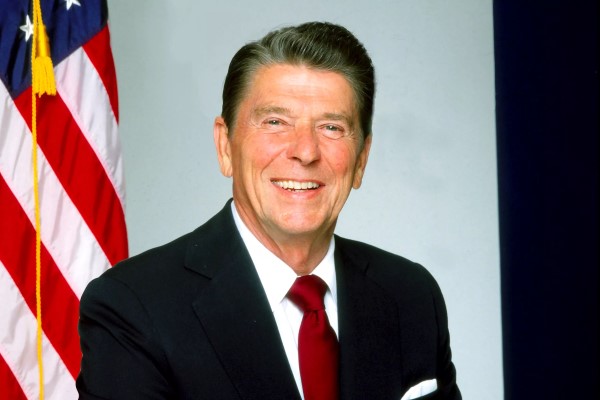
40 – Ronald Reagan (1981-1989)
Born in Illinois, Ronald Reagan, initially a sports announcer and then a movie actor appearing in 53 films, became interested in politics while serving as president of the Screen Actors Guild. Reagan developed a conservative ideology which carried over into his two terms as California’s governor. Americans weary with the Iran hostage situation, inflation, and gas rationing swept Reagan into the presidency. This made him the oldest person to become president until Donald Trump and the first divorced person and only movie actor to assume that role. The grace and wit with which he handled an assassination attempt by John Hinkley Jr. just 69 days post-inauguration, increased his popularity with the American people. His dramatic challenge to Soviet leader Gorbachev to “tear down this wall” no doubt played a role in the Berlin wall being abolished. He became famous for implementing “Reaganomics” characterized by large scale tax cuts, decreased government expenditures, and the promotion of free market activity, and his tenure seemed to bring about increased optimism. His loving and enduring relationship with Nancy, his wife of 52 years, became the stuff of legends. Following his presidency, she cared for him as he struggled with Alzheimer’s disease. Reagan will always be remembered for his fondness of Jelly Bellies, particularly the licorice flavor.
“I have wondered at times what the Ten Commandments would have looked like if Moses had run them through the U.S. Congress.”
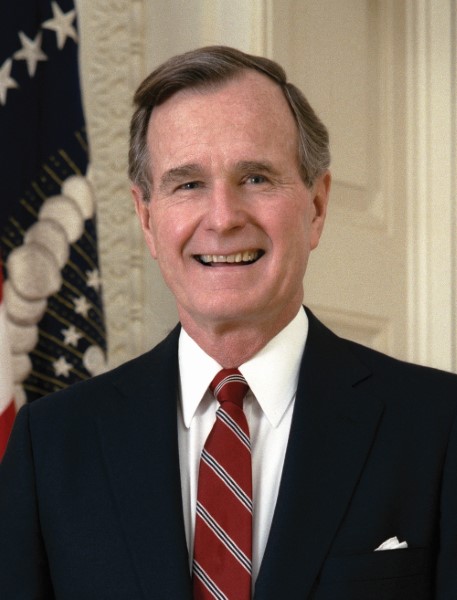
41 – George H.W. Bush (1989-1993)
Born in Massachusetts and later moving to Connecticut, George H.W. Bush became the youngest commissioned naval pilot in WWII and was awarded the Distinguished Flying Cross. After the war and graduation from Yale University with an economics degree, he relocated to Texas and founded his own oil company. From there, he went to Washington D.C. as a congressman, unsuccessfully ran twice for the senate, and served in three key positions–U.S. delegate to the United Nations, chairman of the Republican National Committee, and CIA director.
After failing to secure the 1980 Republican nomination for president, he agreed to become Reagan’s running mate, adding 8 years of vice presidential experience to his resume.
Mostly remembered for leading a coalition of nations to free Kuwait from Iraq invasion in an operation known as Desert Storm, Bush also signed the important Strategic Arms Reduction Treaty (START) which attempted to end weapons build-up between U.S. and U.S.S.R.
Bush struggled with budget deficits and a savings and loan crisis which led to his raising taxes, a thing he had promised not to do and which probably cost him a second term.
His wife Barbara and he had 6 children, one of whom died from childhood leukemia. Bush is remembered for having celebrated his 90th birthday with a parachute jump.
“I want a kinder, gentler nation.”
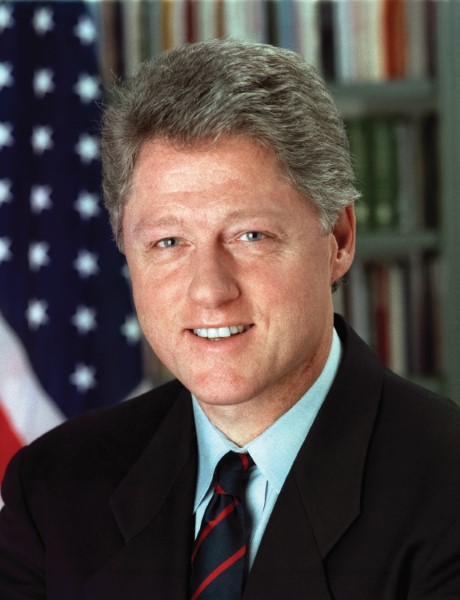
42 – Bill Clinton (1993-2001)
Born in Hope, Arkansas, Bill Clinton, whose father died before his birth, became smitten with politics after shaking President Kennedy’s hand on a Washington D.C. trip. A Rhodes scholar and graduate of Yale Law School, Clinton was elected state attorney general and governor of Arkansas, serving for 12 years. Though he inherited a budget deficit upon assuming the presidency, Clinton presided over a period of low inflation, low unemployment, and low poverty rates and completed his tenure as the last president to see a balanced budget with surplus. Ruth Bader Ginsburg became a Supreme Court justice during his watch. Though Clinton failed to make the healthcare reforms proposed by his wife Hillary, he signed into law the Family and Medical Leave Act and enacted significant crime reduction and welfare reform legislation.
Internationally, he negotiated the North American Free Trade Agreement (NAFTA) with Mexico and Canada, intervened in the Bosnian War to address ethnic cleansing, and helped negotiate the Oslo Accords between Israel and the Palestine Liberation Organization (PLO). Allegations concerning the Whitewater real estate controversy dogged his presidency. Clinton became the first democrat since Franklin Roosevelt to get elected to a 2nd term and the 2nd president to be impeached. The Senate found him innocent of obstruction of justice and perjury charges with respect to an affair with Monica Lewinsky. Of note, Clinton loves to play saxophone and received two Grammy awards for spoken albums.
“I still believe in a place called Hope.”

43 – George W. Bush (2001-2009)
The 2nd son to become the American president after his father, George W. Bush was born in Connecticut and raised in Texas. His education included Yale University, Harvard Business School for MBA, and training as a pilot in the Texas Air National Guard. His first political win was as governor of Texas. The hotly contested presidential election of 2000 between Bush and Al Gore came down to Florida’s vote. When the Supreme Court ruled to quit the manual count in Florida, Bush was awarded their electoral votes for the victory even though Gore won the national popular vote.
On 9/11/2001, a terrorist attack on the World Trade Center and the Pentagon defined his presidency. In response, he created the Department of Homeland Security, enacted the Patriot Act giving law enforcement sweeping powers, and launched a war against Afghanistan and then Iraq leading to the death of their leader Saddam Hussain but failing to find their purported weapons of mass destruction.
A financial crisis attributed to a housing bubble and bad loans, haunted the last year of his presidency and created a deep recession. After leaving the White House, Bush took up oil painting and created a book entitled “Portraits of Courage: A Commander in Chief’s Tribute to America’s Warriors,” the proceeds of which are being used to help veterans and their families.

44 – Barack Obama (2009-2017)
His mother from Kansas and his father from Uganda, Barack Obama, the first African-American president, was born in Hawaii and spent some of his childhood in Indonesia.
He graduated from Columbia University and Harvard Law School and served as a community organizer in Chicago, an Illinois state senator, and a U.S. senator prior to running for president against John McCain in 2008. Upon assuming office, he enacted the American Recovery and Reinvestment Act, a stimulus plan to pull the U.S. out of the recession. Then, he pushed legislation aimed at holding Wall Street and bankers accountable by cracking down on poor loan practices and misuse of bank funds. He ended the war in Iraq, authorized a mission that killed Osama Bin Laden, signed an executive order agreeing to the Paris Climate Accord for limiting carbon emissions and addressing global climate change, brokered the Iran nuclear deal offering Iran incentives in exchange for curbing their nuclear program, and opened U.S. relations with Cuba. During his watch, same-sex marriage was legalized as a result of a Supreme Court ruling. After his legislation failed to pass Congress, Obama issued an executive order termed DACA (Deferred Action on Childhood Arrivals) to protect some undocumented immigrants who arrived in U.S. at an early age. His signature legislation was the Patient Protection and Affordable Care Act or Obamacare. The recipient of many honors, Obama won two Grammy awards for two different spoken word albums, was named Time Magazine’s Person of the Year twice, and was awarded the Nobel Peace Prize in 2009.
“Change will not come if we wait for some other person or some other time. We are the ones we’ve been waiting for. We are the change that we seek.”
Continue to Next Page

